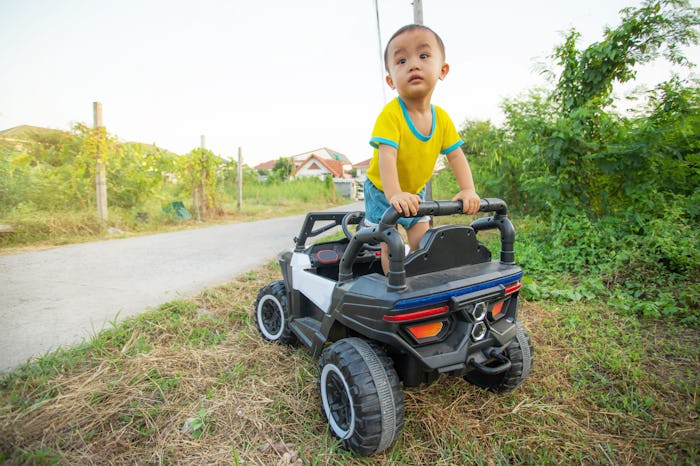Toddlers

Your Toddler's Obsession With Cars Has Some Benefits
And if your toddler has a parking garage's worth of Hot Wheels in your house, know that you're not alone.
If you have a toddler, you know they can get a little obsessed with certain toys. But one type of toy seems to be in every little kid’s favorites — anything with wheels. So, why do toddlers love cars, planes, trains, and all the other automobiles? Child development experts explain why they like cars and trucks so much, what it means, and how to make their obsession a little healthier.
Cars Are Familiar To Toddlers
Honestly, the obsession likely starts because cars, trains, and other vehicle toys are familiar to kids, says Katie Green, certified child life specialist at Children’s of Alabama. They see them in real life and on TV. “Whether it’s cars that talk seen on their favorite television program, or cars they get in and out of each day, they are familiar objects that interest them,” she says. “Toddlers are known for their love and affection for things that move around and make noise — much like them. The horn of a train and flashing lights of the railroad track signals, the boom of a garbage truck emptying the garbage can, and lights and sirens of emergency vehicles all catch the attention of toddlers.”
But there are a few other possible reasons for this obsession, says Stephanie Chapman, Ph.D., pediatric psychologist at Texas Children’s Health Plan The Center for Children and Women. She suggests that cars are all around toddlers, and they understand that they go and move, and see them often. But gender may play a part, too. “Evolutionary psychologists have found that kids with testosterone actually have this fascination more often, so that may explain why our little boys love them even more. On the other hand, kids pick up very quickly on gendered schema, and little boys figure out signals that males are supposed to be interested in cars and trucks, and start to show more interest in those toys around age 3. That’s more of a socio-cultural angle on this obsession.”
Green adds that toddlers also like cause-and-effect toys, where they can learn that when they do one thing, the toy does something else, like blink or make a noise. A lot of car and truck toys fall into that category.
Benefits Of Your Toddler's Car Obsession
But whatever the reason is to explain why your toddler can’t leave the house without their Hot Wheels in hand, supporting your little one’s train, tractor, and car addiction is totally fine. These toys can be a healthy part of their learning. “Every toy that is open-ended in its use has more developmental benefits,” says Chapman. “Hot Wheels and Tonka trucks have a lot of open-ended use because you can hold them, start to understand gravity, rotation, and start to use them in symbolic play where now they’re the police car of the town. Narratives can be played out with toys like this because they can use them creatively. These toys are also great for fine motor development, like linking trains together and working through the frustration when you can’t quite get the tracks to fit, or they fall over and you have to fix them.”
Chapman explains that toys like cars and trucks can also help little ones learn to play with others. Younger toddlers may play their own games with their own cars near each other, but as they develop, they can create stories together using their cars and work as a team (like rushing all the firetrucks across the living room to put out an imaginary blaze).
Just be sure to stock your kiddo’s toy box with vehicle toys that are age-appropriate. Green recommends sticking to the manufacturer’s age listing on the toy’s packaging.
“It’s important not to give a child a toy that is too difficult or complex for their current stage of development, as this can cause frustration when they are unable to figure it out and make it work on their own,” she says. “Toys like a firetruck, ambulance, school bus, or garbage truck allow for children to learn and explore more about our community helpers and be familiar with them should they be in a situation to encounter them. It’s important to avoid toys that have small pieces that could be a choking hazard.”
“Also, think of toys that can be used creatively as possible,” says Chapman. “The light-up trucks that make lots of sounds will be fun for about five minutes, but the little wooden cars or train tracks with a system are a little more interesting. You can use them again and again and again, and you can get another present and add to it.”
Sources:
Katie Green, certified child life specialist at Children’s of Alabama
Stephanie Chapman, Ph.D., pediatric psychologist at Texas Children’s Health Plan The Center for Children and Women
This article was originally published on